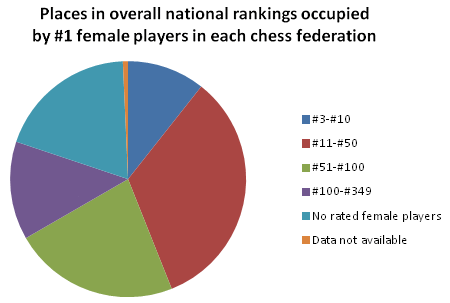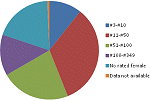Do Women Have a Chance against Men in Chess?
By Peter Zhdanov
“I had rather be the first in this village than second in Rome.”
—Attributed to Julius Caesar by Plutarch, Life of Caesar.
Abstract
FIDE publishes chess rating lists every two month. Even a casual observer will notice that most of the strongest players in the world are male. This article dedicated to the International Women’ Day will partially address another important question: how developed is women’s chess in each particular country? How do the strongest female players compare to their most chess-proficient compatriots?
Methodology
Many criteria can be introduced to define the level of development of women’s chess: what percentage of the registered players is female, what the average rating of female players compared to male is, etc. In this article the idea was to use the official FIDE ratings to analyze the places occupied by the #1 female player of each country in the overall national rankings. The basic assumption behind this approach is that if the country’s environment allows at least one player to succeed, then others might have a chance as well.
Here is an example for Hungary:
| 1 |
Leko, Peter |
2720 |
| 2 |
Almasi, Zoltan |
2719 |
| 3 |
Polgar, Judit |
2709 |
| 4 |
Berkes, Ferenc |
2682 |
| 5 |
Balogh, Csaba |
2664 |
| 6 |
Gyimesi, Zoltan |
2652 |
| 7 |
Erdos, Viktor |
2631 |
| 8 |
Chernin, Alexander |
2614 |
| 9 |
Ribli, Zoltan |
2588 |
| 10 |
Acs, Peter |
2587 |
As you can see, the highest-rated female player in Hungary, Judit Polgar, is ranked #3 on the overall national rating list. Similar data has been collected for other chess federations.
Data analysis: the findings
Detailed statistics on the ratings of top female chess players in each country as compared to male players is provided below [w-rank = world female rank (active players); n-rank = national rank (all players)]:
|
No |
Country |
Player |
rating |
w-rank |
n-rank |
|
1 |
Hungary |
Judit Polgar |
2709 |
1 |
3 |
|
2 |
China |
Hou Yifan |
2639 |
2 |
6 |
|
3 |
India |
Koneru Humpy |
2589 |
3 |
8 |
|
4 |
Slovenia |
Anna Muzychuk |
2583 |
4 |
3 |
|
5 |
Georgia |
Nana Dzagnidze |
2559 |
5 |
12 |
|
6 |
Ukraine |
Kateryna Lahno |
2546 |
7 |
42 |
|
7 |
Russia |
Nadezhda Kosintseva |
2535 |
9 |
104 |
|
8 |
Bulgaria |
Antoaneta Stefanova |
2531 |
10 |
12 |
|
9 |
France |
Marie Sebag |
2512 |
12 |
30 |
|
10 |
USA |
Anna Zatonskih |
2511 |
13 |
40 |
|
11 |
Lithuania |
Viktoria Cmilyte |
2497 |
17 |
7 |
|
12 |
Poland |
Monika Socko |
2493 |
18 |
30 |
|
13 |
Qatar |
Zhu Chen |
2490 |
19 |
3 |
|
14 |
Sweden |
Pia Cramling |
2481 |
24 |
15 |
|
15 |
Armenia |
Elina Danielian |
2478 |
25 |
23 |
|
16 |
Turkey |
Ekaterina Atalik |
24754 |
26 |
8 |
|
17 |
Austria |
Eva Moser |
2460 |
30 |
7 |
|
18 |
Greece |
Elena Dembo |
2460 |
31 |
13 |
|
19 |
Germany |
Elizabeth Paehtz |
2459 |
32 |
83 |
|
20 |
Mongolia |
Batkhuyag Munguntuul |
2451 |
35 |
3 |
|
21 |
Scotland |
Ketevan Arakhamia-Grant |
2434 |
47 |
5 |
|
22 |
Romania |
Corina-Isabela Peptan |
2420 |
49 |
42 |
|
23 |
Spain |
Olga Alexandrova |
2419 |
51 |
77 |
|
24 |
Singapore |
Li Ruofan |
2419 |
52 |
7 |
|
25 |
Slovakia |
Eva Repkova |
2416 |
55 |
12 |
|
26 |
Netherlands |
Peng Zhaoqin |
2405 |
64 |
60 |
|
27 |
England |
Jovanka Houska |
2396 |
69 |
58 |
|
28 |
Serbia |
Natasa Bojkovic |
2395 |
71 |
102 |
|
29 |
Peru |
Deysi Cori T. |
2386 |
76 |
14 |
|
30 |
Ecuador |
Martha Fierro |
2380 |
81 |
7 |
|
31 |
Cuba |
Oleyni Linares Napoles |
2366 |
95 |
71 |
|
32 |
Argentina |
Carolina Lujan |
2364 |
99 |
89 |
|
33 |
Montenegro |
Jovana Vojinovic |
2356 |
105 |
24 |
|
34 |
Vietnam |
Thi Bao Tram Hoang |
2356 |
107 |
18 |
|
35 |
Italy |
Elena Sedina |
2353 |
111 |
49 |
|
36 |
Indonesia |
Irine Kharisma Sukandar |
2349 |
117 |
21 |
|
37 |
Belarus |
Nastassia Ziazulkina |
2343 |
127 |
43 |
|
38 |
Iran |
Atousa Pourkashian |
2343 |
129 |
23 |
|
39 |
Belgium |
Anna Zozulia |
2342 |
130 |
26 |
|
40 |
Luxembourg |
Elvira Berend |
2337 |
139 |
5 |
|
41 |
Uzbekistan |
Nafisa Muminova |
2327 |
151 |
28 |
|
42 |
Azerbaijan |
Gulnar Mammadova |
2324 |
154 |
47 |
|
43 |
Israel |
Masha Klinova |
2321 |
162 |
110 |
|
44 |
Latvia |
Laura Rogule |
2317 |
168 |
36 |
|
45 |
Czech Republic |
Kristyna Havlikova |
2312 |
180 |
141 |
|
46 |
Croatia |
Valentina Golubenko |
2297 |
206 |
130 |
|
47 |
Iceland |
Lenka Ptacnikova |
2289 |
225 |
40 |
|
48 |
Kazakhstan |
Guliskhan Nakhbayeva |
2276 |
246 |
87 |
|
49 |
Australia |
Arianne Caoili |
2269 |
262 |
52 |
|
50 |
Norway |
Ellen Hagesaether |
2265 |
273 |
77 |
|
51 |
Colombia |
Aura Cristina |
2262 |
282 |
58 |
|
52 |
Moldova |
Svetlana Petrenko |
2250 |
320 |
44 |
|
53 |
Estonia |
Valeriya I. Gansvind |
2246 |
331 |
44 |
|
54 |
Finland |
Johanna Paasikangas-T. |
2230 |
366 |
108 |
|
55 |
Brazil |
Vanessa Feliciano Ebert |
2226 |
377 |
165 |
|
56 |
Venezuela |
Sarai Sanchez Castillo |
2219 |
403 |
40 |
|
57 |
Switzerland |
Barbara Hund |
2209 |
431 |
172 |
|
58 |
Denmark |
Nina Hoiberg |
2209 |
435 |
206 |
|
59 |
Philippines |
Chardine Cheradee Camacho |
2190 |
499 |
156 |
|
60 |
Lebanon |
Knarik Mouradian |
2185 |
520 |
13 |
|
61 |
Portugal |
Catarina Leite |
2165 |
583 |
63 |
|
62 |
Albania |
Astrit Zimberi |
2161 |
592 |
28 |
|
63 |
Bangladesh |
Akter Liza Shamima |
2160 |
595 |
38 |
|
64 |
Iraq |
Iman Hasan M. Al-Rufaye |
2159 |
604 |
67 |
|
65 |
Canada |
Natalia Khoudgarian |
2158 |
609 |
251 |
|
66 |
Myanmar |
May Hsett Lwin |
2152 |
641 |
69 |
|
67 |
El Salvador |
Lorena Zepeda |
2130 |
748 |
18 |
|
68 |
Egypt |
Khaled Mona |
2125 |
772 |
177 |
|
69 |
Bermuda |
Zuzana Kovacova |
2123 |
787 |
6 |
|
70 |
Mexico |
Yadira Hernandez Guerrero |
2120 |
800 |
227 |
|
71 |
Uruguay |
Camila Colombo |
2102 |
892 |
52 |
|
72 |
Macedonia |
Gabriela Koskoska |
2094 |
950 |
136 |
|
73 |
Dominican Rep. |
Eneida Perez |
2083 |
1021 |
71 |
|
74 |
Bolivia |
Daniela Cordero |
2082 |
1023 |
67 |
|
75 |
Wales |
Jane Richmond |
2074 |
1082 |
66 |
|
76 |
Chile |
Emilia Larrachea Formas |
2061 |
1156 |
349 |
|
77 |
South Africa |
Melissa Greeff |
2059 |
1170 |
55 |
|
78 |
Algeria |
Amina Mezioud |
2053 |
1209 |
84 |
|
79 |
Paraguay |
Gabriela Vargas |
2043 |
1280 |
44 |
|
80 |
Tajikistan |
Marvorii Nasriddinzoda |
2033 |
1344 |
22 |
|
81 |
Malaysia |
Nur Shazwani Zullkafli |
2032 |
1352 |
109 |
|
82 |
Turkmenistan |
Govher Jorayewa |
2029 |
1368 |
97 |
|
83 |
New Zealand |
Sue Maroroa |
2026 |
1389 |
96 |
|
84 |
Puerto Rico |
Tammy Segara Choe |
2006 |
1548 |
50 |
|
85 |
Costa Rica |
Carolina Munoz |
1995 |
1646 |
92 |
|
86 |
Jamaica |
Deborah Richards |
1989 |
1704 |
29 |
|
87 |
Nicaragua |
Ana Daniela Madrigal |
1974 |
1814 |
71 |
|
88 |
Jordan |
Natalie Fuad |
1970 |
1851 |
84 |
|
89 |
UAE |
Nora MohdSaleh |
1944 |
2084 |
105 |
|
90 |
Sri-Lanka |
S D Ranasinghe |
1914 |
2321 |
102 |
|
91 |
Ireland |
Poornima Menon Jayadev |
1904 |
2403 |
171 |
|
92 |
Monaco |
Julia Label-Arias |
1897 |
2455 |
24 |
|
93 |
Angola |
Maria Conceicao Venancio |
1867 |
2756 |
37 |
|
94 |
Cyprus |
Christianna Markidou |
1846 |
2935 |
36 |
|
95 |
Faroe Islands |
Herborg Hansen |
1844 |
2963 |
59 |
|
96 |
Thailand |
Chanida Taweesupmun |
1826 |
3134 |
78 |
|
97 |
Surinam |
Ekaterina Naipal |
1821 |
3179 |
23 |
|
98 |
Japan |
Emiko Nakagawa |
1806 |
3299 |
87 |
|
99 |
Panama |
Yaribeth Gonzalez |
1804 |
3321 |
44 |
|
100 |
Trinidad & Tobago |
Aditi Soondarsingh |
1772 |
3617 |
61 |
|
101 |
Malta |
Oana Pulpan |
1769 |
3645 |
45 |
|
102 |
Yemen |
Mada Elshereif |
1740 |
3902 |
69 |
|
103 |
Barbados |
Corinne Howard |
1721 |
4112 |
52 |
|
104 |
Macao |
Xiaoyu Xu |
1707 |
4223 |
20 |
|
105 |
South Korea |
Yoomi Lee |
1636 |
4945 |
48 |
|
106 |
Andorra |
Diana Da Rocha Soares |
1614 |
5152 |
41 |
|
107 |
Palau |
Angie Parrado |
1551 |
5681 |
18 |
|
108 |
Mozambique |
Josefa Mendes Lucas |
1548 |
5705 |
9 |
|
109 |
Aruba |
Zaily M. Arbona Avila |
1545 |
5722 |
12 |
|
110 |
Honduras |
Rosa Daniela Ortiz |
1538 |
5765 |
40 |
|
111 |
Chinese Taipei |
Mi Wang |
1533 |
5799 |
29 |
|
112 |
Libya |
Inas Emhemed |
1523 |
5870 |
51 |
|
113 |
Bahrain |
Ishwaryaa Lakshminaryanan |
1509 |
5976 |
31 |
Here are some statistics:
-
Not a single female player is #1 in her country overall. The relative best results belong to: GM Judit Polgar (2709, #3 in Hungary), GM Anna Muzychuk (2583, #3 in Slovenia), GM Zhu Chen (2490, #3 in Qatar), IM Batkhuyag Munguntuul (2451, #3 in Mongolia).
-
27/141 (19.1%) chess federations don’t have any female FIDE-rated players.
-
15/141 (10.6%) federations have a female player who belongs to the top-10 of all players in the country. In other words, only in 10.6% of the chess federations a woman has a tangible chance to play for the main national team. Of course, this is a very optimistic estimate, because only 5 players actually make it to representing the country.
-
47/141(33.3%) federations have a female player rated from #11 to #50 in the country.
-
32/141(22.7%) federations have a female player rated from #51 to #100 in the country.
-
19/141 (13.5%) federations have a female player rated from #101 to #349 (Chile) in the country.
-
1/141 (0.7%): at the time of this writing (March 9th, 2012) no data was available on the ratings of Botswana’s players.

Date source: http://ratings.fide.com/
It is worth noting that this data offers an interesting insight on how successful women’s chess is in each particular country relatively (compared to men’s chess), not absolutely (compared to women from other countries). For example, Russia is usually rated #1 on both the overall top countries list and on the top countries (women) list. In March 2012 China has overtaken the #1 spot on the women’s rankings. More importantly, the highest-rated Russian female chess player, Nadezhda Kosintseva, is ranked only #104 on the national rating list, while Hou Yifan is rated #6 in China. This demonstrates that, while being among the strongest on the world female rankings, Russian women are relatively weak chess-wise in comparison with their male compatriots.
Conclusion
The study proves once again that women are strongly underrepresented in chess at the top levels. 19.1% of the chess federations (nearly every fifth) do not have any FIDE-rated female players. In 70.2% of the federations women are rated #11-#349 in the country, thus basically having no chance to compete for the supreme national title, or even play for the national team. Only 10.6% of the countries have a truly powerful female player ranked #3-#10 on the overall rating list.
About the author
Peter Zhdanov is an IT project manager, debate expert and author of two books on parliamentary debate, BSc in Applied Mathematics and Computer Science and final year PhD student in Sociology.
In chess Peter is a Russian candidate master, author, husband and manager of grandmaster Natalia Pogonina.
|
|
Copyright Zhdanov/ChessBase
Previous articles on the subject

|
Do men and women have different brains?
30.06.2009 – In a recent thought-provoking article WGM Natalia Pogonina and Peter Zhdanov presented their views on the topic of why women are worse at chess than men. A number of our readers were unconviced: they think that efforts at "explaining" differences between the sexes only from environmental factors are doomed at the outset. Recent studies seem to support this. Feedback and articles. |

|
Women and men in chess – smashing the stereotypes
20.06.2009 – On June 5, 2009 WGM Natalia Pogonina and Peter Zhdanov got married – she a Women's Grandmaster, he a successful IT-specialist and debate expert. Peter is also Natalia’s manager, together they are writing a book called "Chess Kamasutra". Today they share with us their views on the perennial topic why women are worse at chess than men, and take a look at the future of women’s chess. |

|
Congratulations to Natalia and Peter, the new chess couple
10.06.2009 – He had read about her in chess magazines and websites. In August 2008 they met at the Tal Memorial. Peter Zhdanov and Natalia Pogonina played some blitz, and a new friendship was born, which eventually blossomed into love and led to a marriage between the two young Russian chess players. They are currently working on an extraordinary book, one you are not going to want to miss. |

|
Gender differences in chess – feedback and a new theory
30.01.2012 – We recently told you about a report on the gender differences in chess – why it is that there is just one woman in the top 100 players in the world, and just 2.2 percent in the top 1000, according to the FIDE rating list. Naturally we received a large number of more or less adamant opinions from our readers, which we now share with you, together with a pet idea of our own. |

|
Gender differences in chess
09.01.2012 – A new and very commendable women's live rating list of top players is being maintained by the Russian chess news portal ChessPro. Fired by this list we did a little additional research to find out how many female players there are in the top 100 and top 1000. What would you estimate? And what are the possible reasons for the superiority of males in certain intellectual activities? Latest research. |





























